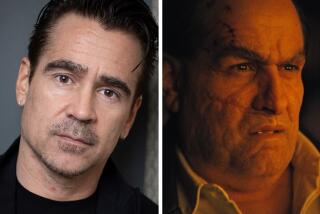Lionsgate to buy Starz network in bid to become bigger media industry competitor

One company is a scrappy Hollywood studio that is looking to become a bigger player in the film and TV business.
Another is a premium cable network that has long operated under the shadow of HBO and Showtime.
Now the two independent companies are joining forces in one of the largest studio deals this decade.
Lionsgate, the movie and TV studio behind “Hunger Games” and “Orange Is the New Black,” on Thursday announced its plans to acquire Starz for $4.4 billion, including debt.
The acquisition, which follows months of on-again-off-again discussions, comes at a time when both companies are facing significant challenges that have put pressure on their stock prices.
As the media industry consolidates, it’s becoming increasingly difficult for smaller, independent studios and stand-alone cable channels to compete with the conglomerates that dominate the landscape, such as Walt Disney Co., Time Warner Inc., 21st Century Fox and Comcast Corp.
“Small doesn’t work anymore,” said Lloyd Greif, chief executive of Los Angeles investment banking firm Greif & Co. “This is the land of the giants, and you want to be a giant.”
It remains to be seen whether the pact will fulfill its promise of turning the combined company into the next big media player. But several analysts said both Santa Monica-based Lionsgate and Englewood, Colo.-based Starz needed to do something to buttress their businesses and navigate the increasingly treacherous media waters.
By buying Starz, Lionsgate will get a TV distribution network for its portfolio with dependable subscription revenue to offset the unreliable box office, an advantage most major media companies already have.
Lionsgate’s stock and cash deal for Starz, which comes out to about $32.753 a share, represents a nearly 18% premium over the average stock price for the cable networks company over the last three weeks.
For its part, Starz would have access to more of the premium content that cable channels need to survive as consumers increasingly look to streaming services for their entertainment.
Independent media firms represent an increasingly endangered species. Comcast’s NBCUniversal announced its plan in April to buy Jeffrey Katzenberg’s DreamWorks Animation for $3.8 billion. Charter Communications in May completed its more than $65-billion deal to roll up Time Warner Cable and Bright House Networks.
Media observers have long expected a marriage of Lionsgate and Starz, given the involvement of cable television tycoon John Malone, who owns interests in both firms and has been a leading proponent of the current wave of media consolidation.
“This is really a John Malone deal to bring totally disparate parts of his empire together in the same fold,” said Mike Goodman, director of digital media at Strategy Analytics near Boston. “John Malone is one of the ultimate deal makers out there.”
Malone, who also controls Liberty Media, is the largest voting shareholder in Starz, and could be handsomely rewarded by the premium that Lionsgate agreed to pay. Malone first invested in Lionsgate early last year, securing a 3.4% stake, and suggested that it made sense to sweep the “free radicals,” – smaller, standalone companies – into one larger entity.
The agreement represents a big step for Lionsgate, which originated in Vancouver, Canada, in 1997 and has spent the last two decades trying to become a Hollywood powerhouse with a savvy financial model that limited its exposure to the risks of the traditional movie business.
It eventually staked its claim among the majors studios with the “Twilight Saga” and “Hunger Games” movies. Lionsgate also has a robust TV business, producing such acclaimed hits as the Hulu series “Casual” and AMC’s “Mad Men.”
Yet the studio’s movie business has suffered recent flops, such as “Gods of Egypt” and “The Divergent Series: Allegiant.” Lionsgate’s stock has plummeted 45% in the last year in the wake of the box-office flops.
Starz has faced its own set of challenges. It has struggled to keep pace with deep-pocketed competitors, including HBO and Netflix, which are magnets for top-tier talent working on high-profile TV projects. The stock is down 32% over the same period.
Nonetheless, Starz Chief Executive Chris Albrecht has steadily built the network’s slate of original programs, including “Outlander” and “Power” that have attracted strong fan bases. The channel has more than 24 million pay-TV subscribers in the U.S. (It also runs its companion Encore movie channels.)
Starz, however, needs more than a few acclaimed shows to thrive in the increasingly cluttered media landscape – particularly as consumers look to pare back their cable bundles. Starz also is losing its supply of recent releases from Walt Disney Co., significantly reducing its access to blockbuster films.
Tying the knot with Lionsgate could provide Starz with a larger pipeline of content and could further protect Lionsgate’s earnings from box-office whims, said Tuna Amobi, a media analyst for S&P Global.
“It definitely does establish them as a survivor in a consolidated landscape,” Amobi said. “They are definitely going to be a more viable competitor.”
Still, some investors were skeptical of the benefits of the transaction. While Starz shares closed Thursday at $29.92, up 5.9%, or $1.67, or 5.9% a share, to $29.92 on Thursday, Lionsgate shares fell 71 cents, or 3%, to $20.23.
Doug Creutz, a media analyst with Cowen & Co., said Lionsgate enjoyed better prospects as a stand-alone movie and TV producer, especially with the rising demand for the type of television shows that Lionsgate makes.
“We think this is a deal that happened because management needed a deal to happen given poor recent financial performance and a declining share price,” Creutz said in a research report.
One question is how soon Lionsgate will be able to steer its movies to Starz, which recently launched its own streaming service. Lionsgate is a part owner in the profitable Epix movie service along with Viacom’s Paramount Pictures and MGM. Epix, in a statement, stressed that Lionsgate remains obligated to distribute its movies through Epix for the foreseeable future.
Lionsgate Chief Executive Jon Feltheimer said in a call with analysts that the union would create “a global content powerhouse … with the increased scale to compete even more effectively and capitalize on growth opportunities in a fast-changing marketplace.”
Lionsgate told analysts that it has secured financing and plans to use $3.6 billion to refinance the two companies’ debt and cover the $1.6 billion it needs to pay the cash component to Starz shareholders. The deal is expected to close this year.
Executives added that Albrecht, the former HBO chief who joined Starz in 2009, would stay on to run the network. He signed a new contract this week extending his employment through 2020.
The deal could eventually pave the way for a combination with an even larger company, such as broadcaster CBS Corp. or media giant Viacom, which owns Paramount Pictures. Sony Pictures, owned by Tokyo-based electronics giant Sony Corp., often has been mentioned as a potential mate for a united Lionsgate/Starz.
“The most optimistic read of the deal is that it brings Lionsgate one step closer to being the vehicle for a rollup of a much larger content company,” Creutz said.
Twitter: @rfaughnder
UPDATES:
4:24 p.m. This article was updated throughout with additional information.
6:21 a.m. This article was updated with the news that Lionsgate had purchased Starz.
This post was originally published at 5:30 a.m.
More to Read
From the Oscars to the Emmys.
Get the Envelope newsletter for exclusive awards season coverage, behind-the-scenes stories from the Envelope podcast and columnist Glenn Whipp’s must-read analysis.
You may occasionally receive promotional content from the Los Angeles Times.








